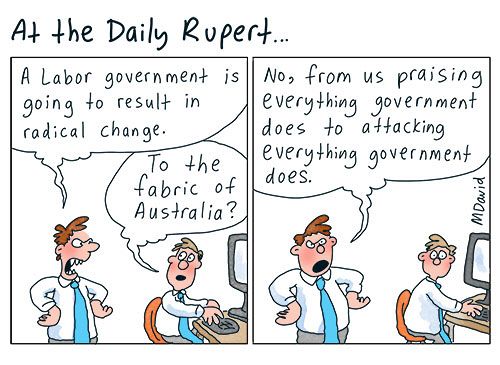Governments, academics and others are celebrating the Morrison Government’s defeat, as Alan Austin reports.
THE WATCHING WORLD appears to have heaved a heavy sigh of relief as Australian voters evicted the Coalition. The dominant reaction is hope for a reset of foreign relations and for Australia to resume its former role as a good global citizen.
In Tokyo last Tuesday, U.S. President Joe Biden warmly congratulated incoming Prime Minister Anthony Albanese. He even knew his name.
China reset
Observers in China evidently followed Australia closely. Sina Finance forthrightly refuted one of Scott Morrison’s principal assertions with this analysis from Guangdong University researcher, Tang Kai, on Albanese:
‘Albanese has [served] as Australia's Deputy Prime Minister, Deputy Leader of the Labor Party and Minister of Transport and Infrastructure. It can be said that Albanese has a wealth of administrative experience.’
Sina Finance added that the main issues for voters were people's livelihoods and climate change.
The China Daily welcomed the change, heading its report ‘Australia gains chance to lift China relations’.
The article quoted Premier Li Keqiang's message to Albanese last Monday affirming China was “ready to work with the Australian side to review the past, face the future and uphold principles of mutual respect and benefit”.
It noted that relations between Canberra and Beijing had deteriorated under Morrison whose ‘Cold War rhetoric in recent years had a negative impact on Chinese Australians’.
The thaw in China-Australia relations was welcomed also by The Jakarta Post, The Times of India and China’s ECNS News.
Pacific Islands celebrate
The Solomon Star joyfully reported Morrison’s departure, quoting Prime Minister Manasseh Sogavare saying:
‘Albanese’s election victory signifies that the people of Australia embraced Mr Albanese’s vision, policy frameworks and the direction he espoused for Australia and more broadly in relation to Australia’s neighbours...’
The New Zealand Herald reported an immediate easing in tensions between Australia and New Zealand.
The Fiji Times greeted new Foreign Minister Penny Wong’s visit with several positive reports including ‘Australia keen to listen to Pacific partners’ and ‘$525m overseas development assistance from Aussie to Pacific’.
Forthright feelings from France
Arguably the Coalition’s most disastrous foreign affairs failure – which cost Australia its global reputation as well as five billion dollars – was its duplicity over the French submarine contract cancelled last year.
The English edition of The Guardian highlighted this in its report headlined, ‘France has “huge hopes” of rebuilding relationship with Australia after Coalition’s “deceitful” behaviour’.
In France, Le Point headed its analysis ‘Australia: Prime Minister Scott Morrison chased from office’. It said the main reason was inaction against climate change — le changement climatique.
Le Point quoted retiring Foreign Affairs Minister Jean-Yves Le Drian who gleefully celebrated la défaite of Scott Morrison:
“The actions taken [by Morrison] were brutal and cynical and I would even say showed notorious incompetence — incompétence notoire.”
Le Figaro greeted the Coalition’s demise with even more scathing commentary from France’s Foreign Minister:
‘Usually not very expansive, Jean-Yves Le Drian then fired red hot bullets at the offenders [the departing Morrison Government] in very undiplomatic and quite rare terms. “Lies”, “duplicity”, “contempt”... He had accused them of having concealed their negotiations for months, denounced a "major breach of trust" between NATO allies...’
Climate action welcomed worldwide
Commentary asserting the Coalition lost because of climate policy failures appeared in several German news outlets, including Stern, Tagesschau and Die Zeit.
The latter reported:
‘For years, the country has suffered from floods, droughts, bush fires, coral bleaching on the Great Barrier Reef and tree dieback in the rainforests. Australia has one of the highest CO2 emissions per capita and is one of the largest coal exporters... Morrison, who was voted out, has always been a supporter of the coal industry. Many members of his party are considered climate change deniers.’
Other publications highlighting climate included The New York Times, The Washington Post, The Star in Malaysia, Slovakia’s Pravda, The Belfast Telegraph, Indonesia’s Kompas and Spain’s Euronews.
The personalities
Several outlets reheated the old Albanese family history, including The UK Guardian:
‘The student activist and political bomb-thrower from Labor’s socialist Left who famously spoke of enjoying “fighting Tories”, reborn as a centrist “statesman” leader backing moderation on climate and tax. A boy who lived with his single mother...’
U.S.-based The Diplomat skewered the losing PM:
‘Galvanizing all these grievances was the deeply unpopular Prime Minister Scott Morrison, who repeatedly dodged responsibility, obdurately refused to reform and assumed a clownish persona he hoped would retain his electoral appeal.’
Positive Coalition assessments
The Times of Israel expressed support for the departing PM and caution towards the newcomer:
‘Morrison, who heads the Liberal Party, was considered a good friend of Israel, heading one of a handful of governments to somewhat follow former U.S. President Donald Trump’s lead on Jerusalem... Albanese in the past has described himself as “a strong advocate of justice for Palestinians” and has said he is “very critical of a lot of Israel’s policies”.’
Reports by the Australian Associated Press were run extensively, including in the USA, Canada and India.
Unsurprisingly, given the Coalition has paid this agency a lot of quid pro quo money, its obituary was hagiographic:
‘Still Morrison, after congratulating Albanese, struck a proud and defiant tone in defending his and his Government’s record, focusing on the economy, his administration’s work to stop refugees coming to the country by boats and on bolstering the nation’s defences.’
Challenges ahead
The Independent in Ireland focused on the challenges facing the incoming Labor Government:
‘Labor has promised more financial assistance and a robust social safety net as Australia grapples with the highest inflation since 2001 and soaring housing prices.
The Party also plans to increase minimal wages and on the foreign policy front, it proposed to establish a Pacific defence school to train neighbouring armies in response to China’s potential military presence...’
Optimistic assessments overall of Australia’s future featured in The Times of London, Japan Today, SVT Nyheter in Sweden, La Voz in Chile, Argmedios in Argentina and El Confidencial in Spain.
We shall soon see if their hopes are realised.
Alan Austin is an Independent Australia columnist and freelance journalist. You can follow him on Twitter @alanaustin001.
Related Articles
- Well done, Australia — now let’s fix the joint up properly
- Flashback 2019: Kill Bill 4: Suffering under ScoMo
- Labor possibly handing Morrison another election victory
- Labor needs to stand up
- Media inequality: Labor is on an uneven playing field
 This work is licensed under a Creative Commons Attribution-NonCommercial-NoDerivs 3.0 Australia License
This work is licensed under a Creative Commons Attribution-NonCommercial-NoDerivs 3.0 Australia License
Support independent journalism Subscribe to IA.
















